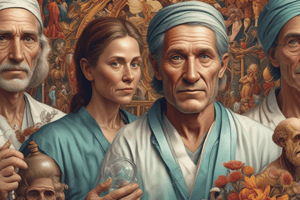Podcast
Questions and Answers
What is the primary role of antibiotics in healthcare?
What is the primary role of antibiotics in healthcare?
- To enhance the body's immune system
- To prevent the spread of viruses
- To eliminate all types of pathogens
- To treat and prevent serious bacterial infections (correct)
Which career pathway focuses on directly changing the health status of patients over time?
Which career pathway focuses on directly changing the health status of patients over time?
- Therapeutic Service (correct)
- Diagnostic Service
- Biotechnology Research and Development
- Health Informatics
Which of the following is NOT considered a type of healthcare facility?
Which of the following is NOT considered a type of healthcare facility?
- Long-Term Care
- Home Health Care
- Fitness Center (correct)
- Laboratories
What discovery is credited to Alexander Flemming?
What discovery is credited to Alexander Flemming?
What factor contributes to antibiotics losing their effectiveness?
What factor contributes to antibiotics losing their effectiveness?
What is the primary reason some ancient cultures attributed health and illness to the moods of the gods?
What is the primary reason some ancient cultures attributed health and illness to the moods of the gods?
What significant contribution did Hippocrates make to medicine?
What significant contribution did Hippocrates make to medicine?
Which figure documented the importance of the spinal cord?
Which figure documented the importance of the spinal cord?
Which surgical practice is associated with barber-surgeons?
Which surgical practice is associated with barber-surgeons?
What was the basis for Edward Jenner's discovery related to smallpox vaccinations?
What was the basis for Edward Jenner's discovery related to smallpox vaccinations?
What does medical asepsis refer to?
What does medical asepsis refer to?
Which of the following was introduced by Joseph Lister?
Which of the following was introduced by Joseph Lister?
What symbol was adopted in ancient times to represent physicians?
What symbol was adopted in ancient times to represent physicians?
Flashcards are hidden until you start studying
Study Notes
History of Healthcare
- Human beings have practiced medicine in various forms throughout history, attributing health and illness to divine moods or rational explanations.
- Ancient healers utilized natural remedies, including diet, rest, and herbal medications; surgical practices were also employed.
- Religion played a significant role in healthcare practices during ancient times.
Caduceus
- The Caduceus, a symbol representing physicians, is rooted in Greek mythology, linked to Asclepius, the Greek God of healing.
- The symbol is represented by a staff entwined with a snake.
Hippocrates
- Regarded as the father of Western medicine, Hippocrates practiced around 400 B.C.
- Emphasized fresh air, exercise, and healthy food for health maintenance and illness prevention.
- Introduced the Hippocratic Oath, establishing ethical standards for medical practitioners.
Galen
- A Greek physician trained in Egypt, known for treating gladiators and advancing surgical knowledge.
- Documented the significance of the spinal cord in limb movements and developed surgical techniques like tracheotomy to address breathing difficulties.
Barber-Surgeons
- Practiced surgical procedures including cataract surgery and bloodletting, also served military roles treating combat injuries.
- Recognizable by the striped pole outside barber shops, symbolizing their dual role.
Smallpox and Vaccinations
- Edward Jenner pioneered vaccination in 1796 by using cowpox fluid to inoculate against smallpox, stemming from observations about milkmaids.
Medical Asepsis
- Refers to the presence of disease-causing microorganisms; emphasized by Joseph Lister's insistence on disinfection procedures in surgery.
Pathogens
- Robert Koch's discoveries established a foundation for modern bacteriology, focusing on disease-producing microorganisms.
Penicillin
- Alexander Fleming discovered penicillin, leading to mass production beginning in 1943, marking the dawn of antibiotics.
- Concerns arise regarding antibiotic effectiveness due to overuse and bacterial evolution.
Career Pathways in Healthcare
- Therapeutic Service: Focus on direct patient care, treatment, counseling, or health education.
- Diagnostic Service: Aims to identify health issues in a secure environment, providing timely and cost-effective care.
- Health Informatics: Involves IT to organize health records, aiming to improve healthcare outcomes.
- Support Services: Encompasses adaptations and partnerships in health settings such as occupational and physical therapy.
- Biotechnology Research and Development: Relies on science and engineering to innovate treatments and ultimately enhance patient care.
Types of Healthcare Facilities
- Long-Term Care: Facilities providing extended care for residents needing constant support.
- Practitioners’ Office: Primary care locations for consultations and routine health check-ups.
- Clinic: Basic health service sites for minor illnesses and preventative care.
- Laboratories: Testing and analysis centers for medical conditions.
- EMS (Emergency Medical Services): Provides urgent medical care and transportation.
- Home Health Care: In-home services giving patients personalized medical assistance.
- Rehabilitation: Facilities dedicated to help regain skills or functionalities post-injury or illness.
- Hospice: Specialized care focusing on improving quality of life for terminal patients and their families.
Studying That Suits You
Use AI to generate personalized quizzes and flashcards to suit your learning preferences.




